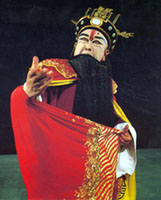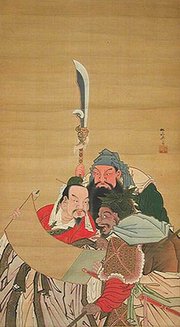Romance of the Three Kingdoms
|
|
Romance of the Three Kingdoms (Simplified Chinese: 三国演义; Traditional Chinese: 三國演義, Pinyin: sān guó yǎn yì), written by Luo Guanzhong in the 14th century, is a Chinese historical novel about the turbulent period often referred to as the Three Kingdoms (220-280). It is acclaimed as one of the Four Classics of Chinese literature.
| Contents |
Origin
Stories from the Three Kingdoms period existed in the verbal form before any written compilations. In these popular stories the characters typically took on exaggerated and mythical characteristics, often becoming immortals or supernatural beings with magical powers. With their focus on the history of Han Chinese, the stories grew in popularity during the reign of the foreign Mongol emperors of the Yuan Dynasty (AD 1279-1368). During the succeeding Ming Dynasty an interest in plays and novels resulted in further expansions and retelling of the stories.
The earliest attempt to combine these stories into a written work was San Guo Zhi Ping Hua (三国志评话), published sometime between 1321 and 1323. This version combined themes of magic, myth, and morality to appeal to peasant-class readers. Elements of reincarnation and karma were woven into this version of the story. The decline of the Han Dynasty was therefore traced to the sins of its founding emperor, Emperor Gao, who unjustly executed his three able generals Han Xin, Peng Yue (彭越) and Ying Bu (英布). Han Gao Zu was later reborn as the last Han emperor, Emperor Xian, while the three generals were reincarnated as rulers of the three kingdoms: Han Xin became Cao Cao; Peng Yue became Liu Bei; and Ying Bu became Sun Quan. This time the emperor was to suffer in the hands of Cao Cao.
The Romance of the Three Kingdoms as we know it today was written by Luo Guanzhong sometime between 1330 and 1400 (late Yuan to early Ming period). His novel was written in plain Chinese and was considered the standard text for 300 years. Luo made greater use of available historical records including the Chronicles of the Three Kingdoms compiled by Chen Shou, which covered events from the Yellow Turban Rebellion in AD 184 up to the unification of the three kingdoms under the Jin Dynasty in AD 280. Luo combined this historical knowledge with his gift in storytelling to create a rich tapestry of personalities.
Story
It must be understood that one of the greatest achievements of the Romance of the Three Kingdoms is the extreme complexity of its stories and characters. The novel is strung with numerous "mini-stories", many of which could be developed into full-length feature films in their own right. As such, the following effort only serves as a crude summary of the entire story from a bird's eye view without zooming in too much into individual events or characters:
The story was set in the waning days of Han Dynasty, when the last Han emperors placed heavy trust in eunuchs and ostracized able officials. The government became extremely corrupt and inefficient, leading to serious deterioration in economy and security. During the reign of the second last Han emperor, Emperor Ling, the Yellow Turban Rebellion broke out under the leadership of Zhang Jiao, who practised Taoist wizardry and held immortal powers.
The rebellion was quickly put down with the collective effort of the various marquises under the leadership of He Jin, who was the brother-in-law of the emperor and served as the chief general to the central government. However, He Jin was soon tricked into the palace and murdered by the eunuchs. A fight then broke out within the palace between the eunuchs and angry marquises, resulting in the victory of the latter.
Among the nobles who came to the rescue of the emperor was Dong Zhuo, who was a governor of Western Liang. Dong took the opportunity to move into the palace under the pretense to protect the emperor. He then deposed Emperor Ling and placed in the throne Emperor Xian, whom he held in his power.
Dong's tyrannical behavior soon aroused wrath of the marquises, who united their forces behind Yuan Shao and drove Dong from Luoyang to Chang'an. Dong was eventually killed by his own foster son Lü Bu, mightiest warrior of his time, over Diao Chan, a beautiful woman they both coveted.
In the mean time, however, the nobles were having internal disagreements of their own. Sun Jian, father to Sun Ce and Sun Quan, even stole the imperial stamp amid the chaos. Without a strong central government, the marquises returned to their own territories and soon began fighting among themselves. Many talented leaders who were formally without title or troops, such as Cao Cao and Liu Bei, were also building up their own forces.

A series of events that ensued saw the rise in Cao Cao's power. A major victory Cao scored was at Guandu, during the military campaign against Yuan Shao. The defeat of the latter laid foundation for Cao's absolute power over the entire northern China.
Meanwhile, Liu Bei established his base in Xinye (新野). There he acquired his chief advisor Zhuge Liang after three visits to the latter's home. During the first two visits, Zhuge refused to see his visitors, pretending to be out. Only on the last visit was Zhuge moved by the sincerity and perseverance of Liu and agreed to join his side.
After quelling Yuan Shao's forces, Cao Cao soon turned his attention south. He personally led troops to invade Xinye. The people of Xinye loved and respected Liu, for he governed the city well. In face of the imminent invasion, the entire city decided to follow Liu on foot further south into Jingzhou to seek protection from Liu Biao, who was a distant cousin of Liu Bei.
Unfortunately, Liu Biao had newly passed away, leaving Jingzhou split between his two sons. Leading the people of Xinye to Xiangyang, where the younger son of Liu Biao ruled, Liu Bei was denied entry to the city. He had no choice but to carry on south towards Jiangxia (江夏), where the elder son ruled. In Jiangxia, Liu Bei was finally able to establish a foothold against the onslaught of Cao Cao.
Away in the southwest, Sun Quan was newly placed in command after the death of his elder brother Sun Ce. Both Cao Cao and Liu Bei intended to ally with Sun. However, Zhuge Liang personally journeyed to Chaisang (柴桑) and persuaded Sun to cooperate with Liu. This collusion eventually led to Cao's heaviest defeat at the Battle of Red Cliffs.
In a bid to do away with Liu Bei, whom he deemed to be a potential threat, Sun Quan offered to marry his own sister to Liu. Liu was then lured to Chaisang for the wedding. However, Sun was very filial towards his mother, who liked Liu and insisted that no harm was to come to him. Also with the cunning of Zhuge Liang, Liu finally escaped back to Jiangxia together with his new wife.
Overall situation among the three major powers almost reached a stalemate after this, until Cao Cao died in AD 220 (probably of a brain tumor). In the next year, Cao Cao's second son Cao Pi forced Emperor Xian to abdicate and formally established the kingdom of Wei. In response to this, Liu Bei declared himself lord of the kingdom of Shu Han (to signify that he still carried on the bloodline of the Han royal family but was based in Shu).
At this time, Sun Quan's leaning swayed to Wei again. He accepted Cao Pi's acknowledgement of his status as the lord of the kingdom of Wu. This allowed Sun to concentrate his forces against Liu Bei, who had launched a war against Wu over the slaying of Guan Yu by Sun.
A series of strategic mistakes due to the impetuosity of Liu Bei led to the defeat of Shu troops. However, Lu Xun (陆逊), the military advisor of Wu who spearheaded the war against Shu, refrained from pursuing deep into the west. True to Lu's cautionary move, Cao Pi launched an invasion against Wu, thinking that Wu forces would still be abroad. The invasion was crushed by strong Wu resistance, coupled with a plague outbreak.
Zhuge_Liang.jpg
Meanwhile in the kingdom of Shu, Liu Bei died of sickness, leaving his young and weak-willed son Liu Shan in the care of Zhuge Liang. Seizing this opportunity, Cao Pi tried to bribe several forces, including Sun Quan and minority tribes, into attacking Shu. An envoy from Shu eventually persuaded Sun Quan to withdraw his troops, but Zhuge Liang still had to deal with forces from the minority tribes.
In one of his final strokes of brilliance, Zhuge Liang launched a campaign against Meng Huo, the king of Man tribe (蛮族). Zhuge Liang captured Meng Huo alive for seven times, each time letting him go unscathed. Meng Huo was moved by Zhuge Liang's wit and benevolence and swore allegiance to Shu forever.
At this time, Cao Pi also passed away in illness. Zhuge Liang then turned his eyes northwards. However, his days were numbered. His last significant victory against Wei was probably the defection of Jiang Wei, a general whose brilliance paralleled his own. Jiang carried on Zhuge Liang's campaign against Wei to a bitter end, even after Liu Shan surrendered. Jiang plotted to incite an internal strife between two leading Wei generals. However, he was not able to see it to the end when his heartache grew intolerable in the midst of the final battle. He then killed himself with a sword, marking the last stand of Shu.
The long years of battle between Wei and Shu saw many changes on Wei's throne. The Cao family gradually grew weak. Eventually, during the reign of Cao Huan, Sima Yan forced him to abdicate in the same fashion Cao Pi forced Xian Di. Sima Yan then established the Jin Dynasty in AD 265, making himself the first emperor of the new dynasty.
The last lord of the kingdom of Wu, Sun Hao (孙皓), was subdued by Sima Yan only in AD 280. All three last rulers of the kingdoms, Cao Huan, Liu Shan and Sun Hao, were allowed to live till their natural deaths. Thus the Three Kingdoms period was eventually concluded after almost a century of civil strife.
Literary Criticism
Luo Guanzhong's re-telling of this story also give us a window into the politics of his time. The contemporary Ming Emperor Wanli had officially elevated Guan Yu to the position of a god, Lord Guan, to emphasize Guan Yu's characteristics of bravery and extreme fidelity (characteristics the emperor no doubt wanted to promote in his subjects). Luo Guanzhong, however, gives us a more subtle Guan Yu who dies a shattered idol, deserving pity because of his overconfidence. This dissonance was overlooked in traditional commentaries on the text but recent research finds in Luo Guanzhong's Guan Yu a fascinating reflection of Chinese culture under Ming rule, the author complying with the program of imperial propaganda while also subtly subverting it.
Besides the famous oath, many Chinese proverbs in use today are derived from the novel:
- "Spouses are as clothing, but brothers are as limbs." (a broken marriage can be easily sewn back together, but a damaged friendship can never be repaired or replaced)
- "Speak of 'Cao Cao' and Cao Cao is at the gates" (equivalent to "speak of the devil" in English when a person under discussion suddenly appears)
Buddhist aspects
Romance of the Three Kingdoms recorded stories of a Buddhist monk, who was a friend of the renowned general Guan Yu and informed him of an assassination attempt. The monk later helped Guan's reincarnation. As the novel was written in the Ming dynasty, more than 1000 years after the era, these stories showed that Buddhism had long been a significant ingredient of the mainstream culture and may not be historically accurate. Luo Guanzhong preserved these descriptions from earlier versions of the novel to support his portrait of Guan Yu as a faithful but sometimes arrogant man of virtue. Guan Yu was, from then onwards, known as Guan Gong.
Popular saying
Regarding this novel and another Chinese classic Water Margin, there is a popular saying passing down in China that goes: "少不讀水滸, 老不讀三國", translated as "The young shouldn't read Water Margin while the old shouldn't read The Three Kingdoms." The former depicts the lives of outlaws and their defiance with the established social system. Along with the frequent violence, brawls, passionate brotherhood and an emphasis on machismo, it could easily have a negative influence on young boys. The latter presents all kinds of sophisticated stratagum, deceptions, frauds, trickeries, traps and snares employed by the three kingdoms and their individual characters to compete with each other, which might tempt the experienced old readers (the old and senile are traditionally well respected, trusted and considered wise and kindhearted in Chinese society) to use them to harm other people. Besides, old people are supposed to "know the will of the heavens" (says Confucious). They shouldn't exhaust or strain themselves with always having to consider how to deceive others.
Related Articles
External links
- Good online version of the novel with enough reference to pre-Three Kingdoms Chinese history. Explanations of verses are aligned by Java Applets. (http://www.threekingdoms.com)
- Several chapters of the original Chinese text. (http://www.cnd.org/Classics/Novels/San_Guo/)
- Website written by a Chinese-American and an American. Section dedicated to the Romance of the Three Kingdoms novel and history with translated and original content. (http://kongming.net/novel/)
- Website written by a Chinese. A view of the novel and the historical period from the TV series perspective. (http://www.3kingdoms.net/)
- English/Chinese Name Conversion Chart (http://www.kongming.net/novel/hanzi). An ever-growing list of Chinese officers with their names as found in English followed by their Chinese Hanzi.
- English translation of the novel, by C. H. Brewitt-Taylor (http://www.eze33.com/war/sanguo/notes.htm)
- Heavily anachronistic comedy manga of the book (http://www.shiji.cc/san/index.php?mode=view&view=1)
de:Geschichte der drei Reiche
fr:Histoire des Trois royaumes
ko:삼국지연의
ja:三国志演義
fi:Sanguozhi yanyi
vi:Tam Quốc diễn nghĩa
zh:三国演义


